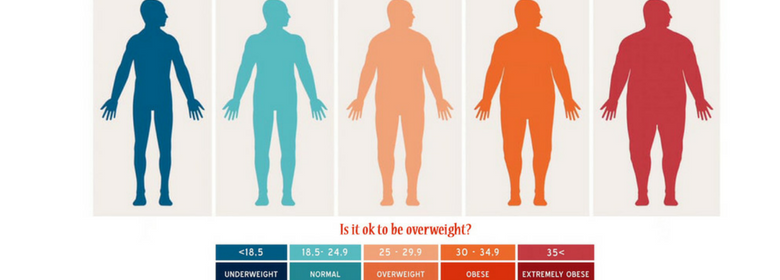Being Overweight May Be Okay; Being Obese Is Not

Debates have raged on in recent years over the matter of weight and self image. Words like ‘fat shaming’ and ‘body positive’ have suddenly become part of our vocabularies.
But we’re not discussing political correctness here. We’re talking about how, sometimes, it’s actually okay to be ‘fat’. From a health perspective.
Curiosity triggered? We certainly hope so.
The Problem With Our Definition Of Fatness
The thing to understand: what is considered ‘fat’ today might not be what was considered ‘fat’ years ago, or indeed what will be called ‘fat’ in the future.
We tend to rely on things like the Body Mass Index (BMI) to establish whether a person is ‘overweight’. Ironic, because the BMI scale is notoriously unreliable. In fact, 6’ 4” NFL player Michael Jasper weighed 375 pounds in his playing days. This would put his BMI at 45.65, classified as ‘obese class III.’
‘Obese class III’ sounds scary, but consider the facts. This is a man who could jump 28 inches into the air, and complete a 40-yard sprint in 5.53 seconds.
Few ‘fit’ people can claim stats like that, and that’s the issue. Depending on systems we don’t fully understand, we often panic even when things aren’t as dangerous as we think they are.
Okay, So What Should I Be Concerned About?
Most studies conclude that fitness and nutrition play a more vital role in your health than your weight. In fact, one study actually found that being ‘overweight’ (not obese) on the BMI scale is healthier than being in the “clinically normal” weight zone. Of course, other studies contradict this.
The logical conclusion, then, is that we can’t really rely on numbers like body weight to understand how healthy a person really is.
Bonus: Being Overweight (Not Obese) Provides Other Benefits Too
Having reserves of fat can actually come in handy. It can help you with a boost of energy when you’re sick, and has been shown to increase longevity.
What You Can (And Should) Do
Don’t worry about how much you weigh. Instead, focus on your lifestyle, fitness and nutrition habits. These, more than anything, dictate how healthy your life is.
Being fat isn’t necessarily unhealthy, nor is being slim necessarily healthy. If you’re ‘overweight and unhealthy’ or ‘slim and unhealthy’, change your lifestyle.
References:
https://www.sportingcharts.com/articles/nfl/what-is-the-average-bmi-of-an-nfl-player.aspx



